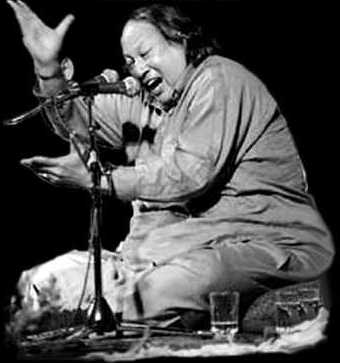Music |
Muslim Music
By
Published: Jun 15, 2016
Category:
World
If you don’t know better, Muslims are barbarians who have traded their traditional robes and swords for assault rifles and bombs. This is, of course, nonsense. There are men and women who call themselves Muslims but are really just thugs and criminals. And then there are men and women of good will, some of whom make the kind of music that other “Muslims” hate. Like these musicians…
Ali Farka Toure
He was born in a small town 50 miles from Timbuktu. His family was large; he had no formal schooling. He did, from an early age, work the land, and it was the land that was his first and best teacher. On the farm, he learned not just the usefulness of his labor, but the magic — although he was a Muslim, he believed also in spirits who live beneath the surface of the River Niger and control both cosmic destiny and mundane reality.
His grandmother was a priestess in “spirit ceremonies.” He attended often, and fell under the spell of the music. At 12, he made his own guitar. Years later, he heard American blues masters, notably John Lee Hooker. He could hear the farm in Hooker’s music, he could smell the dirt. The marriage between Africa and America was inevitable — the music Ali Farka Toure invented is now called “desert blues.”
Nusrat Fateh Ali Khan
He was bigger than Elvis. But unless you haunt the “World Music” bins, the name is probably unfamiliar. That’s not the case anywhere else in the world; music lovers in Europe, Asia and the Middle East are well aware that Nusrat recorded some 125 CDs. And that he was very possibly the greatest blues singer on the planet — I read somewhere that Van Morrison called Nusrat the greatest singer, period.
Nusrat was a Pakistani Qawaali singer. His family had been singers for six hundred years; at 16, his father died and he was drafted into his family’s singing group. Perfect timing: Qawaali was about to change from music inspired by Sufi prayers to music that merged spirituality with technology.
Divas of Mali
Most women in Mali marry by 18 and have 7 children. Mortality rate for pregnant women: about 1 in 12, among the 10 highest in the world. Genital cutting? In Mali, it’s almost universal.
And yet the culture of Mali permits — even encourages — women to sing.
This CD, featuring eleven of Mali’s best-known female singers, reminds us that people can and do transcend their situations. They may be poor, badly compensated, unknown outside their villages — as musicians, they’re triumphant.
Amadou and Mariam
Amadou Bagayoko and Mariam Doumbia are from Mali. They met in the 1970s, married in 1980 and started performing together. Like their fellow musicians from Mali, they started with their country’s version of the blues. Along the way, they went international and borrowed from cultures as diverse as Cuba and France. And they became very popular indeed.
Small fact: They’re blind. Both of them. And possessed of the unusual joy that is the special province of some of the unsighted.
Bombino
Omara Moctar was born in 1980. He’s a Tuareg. (Volkswagen named its off-road SUV after this tribe of desert nomads in Niger.) The Tuareg, who are descended from the Berbers of North Africa, are fiercely independent. Once they fought against colonialism. They’re Muslims who resist Islamic fundamentalism. (“These invaders from Mali are not welcome in any of our lands,” Moctar says. “We reject their philosophies and their idea of Islam.”)
In the 1990s, civil war wracked Niger. The Tuaregs were declared enemies of the state. Moctar and his family fled to Algeria. Relatives brought guitars, and Moctar learned to play. Fighting subsided. Moctar’s family returned to Niger. But in 2007, when he’d launched a band, there was a second Taureg rebellion and a harsher government response. Two of Moctar’s musicians were killed; Moctar fled to Burkina Faso.
Khaled
Khaled sings Rai, which comes out of the religious music of northwestern Algeria. But as rock ‘n roll moved around the world, the background got livelier — accordion, electric guitar, multiple drums — and the lyrics were no longer derived from Sufi prayers. Instead of hymns to God, singers started praising alcohol, parties, sex. And politics — which is why “Rai,” freely translated, means “point-of-view” or “my way.”
In one song, he sings of “Islamic charlatans” — yes, that could inspire a guy to put some distance between himself and the Fundamentalists. Especially because he was also singing about women’s’ liberation, religious freedom and cultural tolerance. And because Islamic fundamentalists did assassinate a Rai singer in Algeria, Rai singers promptly fled to Paris, where Khaled would come to record with some Jamaican musicians and hire Don Was, a Jew from Los Angeles, as his producer.


